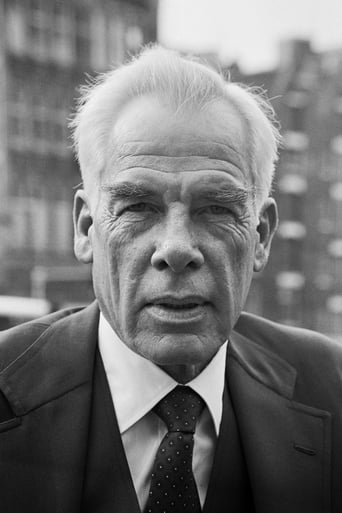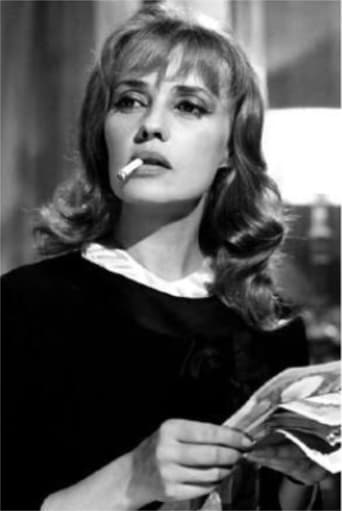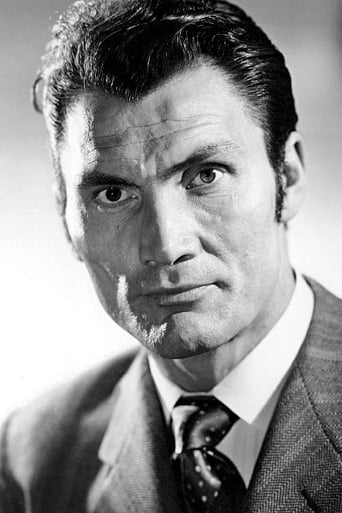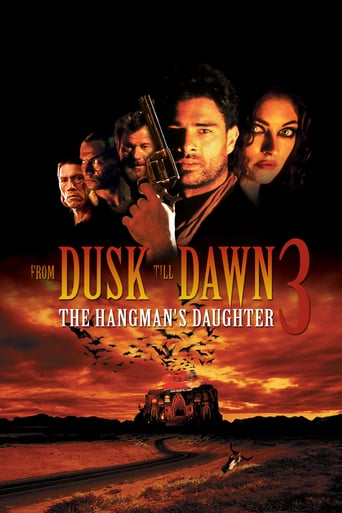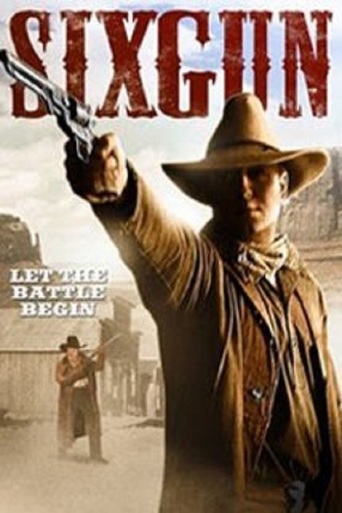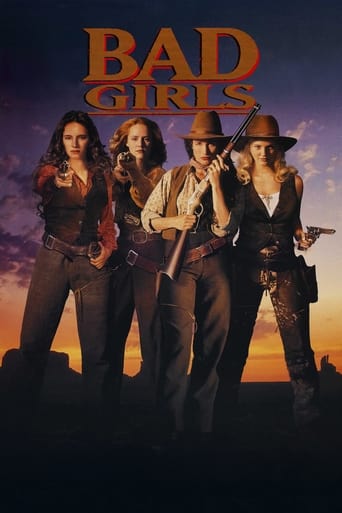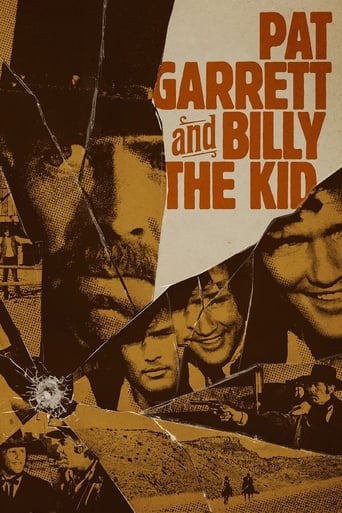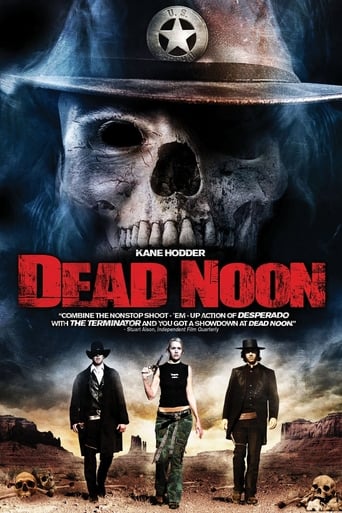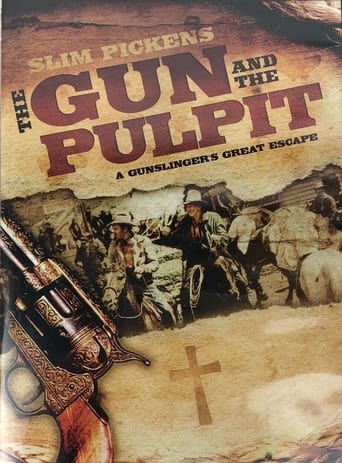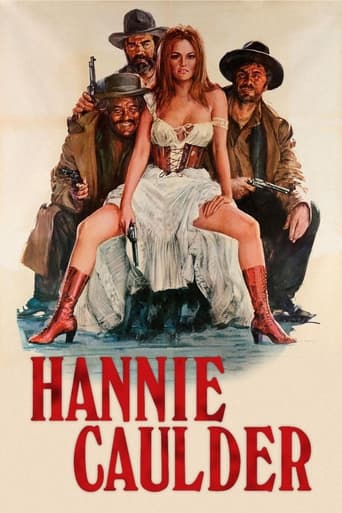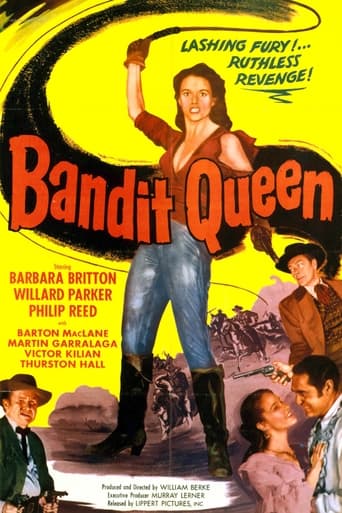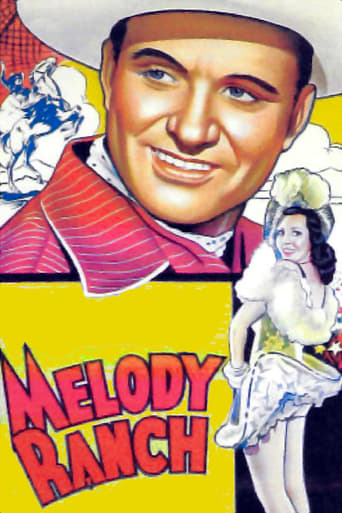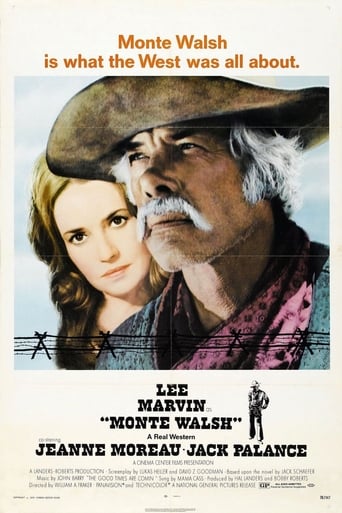

Monte Walsh (1970)
Monte Walsh is an aging cowboy facing the ending days of the Wild West era. As barbed wire and railways steadily eliminate the need for the cowboy, Monte and his friends are left with fewer and fewer options. New work opportunities are available to them, but the freedom of the open prarie is what they long for. Eventually, they all must say goodbye to the lives they knew, and try to make a new start.
Watch Trailer
Cast


Similar titles
Reviews
So much average
In truth, there is barely enough story here to make a film.
It's an amazing and heartbreaking story.
There's no way I can possibly love it entirely but I just think its ridiculously bad, but enjoyable at the same time.
(Thematic SPOILERS)This is half of a great movie. The great half is the first, where we meet cowboys dealing with a time when their world is coming to an end. Corporations are taking over, and the work of the cowboy is needed less and less.The second half is where things go awry. The movie goes into formula mode. The greatness of the first half, with its quiet moments of reflection, and views of life on the range, go away. In their place is murder, heartbreak and revenge. I was very disappointed in the way the film went.Often-cinematographer William Fraker takes the Director's Chair here and does admirably. He is supported by David Walsh behind the camera. John Barry provides an excellent score. He would later earn an Oscar with "Dances with Wolves," and fans of that score can get more of Barry's work in the Western genre here. Barry strays into his James Bond score work occasionally here, which is distracting.The issue in this film is with the origin material. Jack Shaefer, who wrote the novel, also wrote "Shane." Maybe he wasn't ready to go without overt drama to make his point. That's too bad.****** (6 Out of 10 Stars)
The Mama Cass tune over the opening credits seems to herald a new era as she sings 'The Good Times Are Comin', but as the picture progresses, it becomes apparent that the good times are about to fade forever for Monte Walsh. Lee Marvin portrays the title character, Jack Palance is his loyal friend and partner Chet Rollins. The entire film pays tribute to a dying breed, the passing of the cowboy way of life, taking it's toll on those free and independent spirits who never had the time or inclination to just settle down. Some can't take it, like Fightin' Joe Hooker (John McLiam) who goes out in his own blaze of glory by charging his horse over a cliff. Others, like Palance's character, succumb to the banality of becoming a hardware husband, replete with shop apron and shelves full of merchant goods. There's worse things than winding up a Texas Jack Butler in a Wild West Roundup Show, but it's tough to keep your integrity intact when the rest of the life you've known is falling away in a steady slide toward oblivion. It's that prevailing melancholy that pervades "Monte Walsh", the character and the movie, that makes it so difficult yet wonderful to watch. An ode to the Old West that confirms that nobody gets to be a cowboy forever.
It begins as a comedy about committed cow punchers then turns dramatic as the old way of life begins to dry up and the cowboys have to adapt to changing circumstances. Nothing much new there. But in fact it has its innovative moments despite its overall derivative tone.It owes a lot to the success of "Butch Cassidy and the Sundance Kid," an enormous success released the year before. "Butch" was about the end of the Old West's outlaw culture, while this is about cattle drives. "Butch" had a silly pop tune, "Raindrops Keep Falling On My Head." This one has Mama Cass singing, "The good times are coming. They're coming real soon. And I'm not just pitching pennies at the moon." You will be forgiven for noting a family resemblance.Lee Marvin is decked out in the semi-army campaign hat he and his directors seemed to favor at the time -- "The Professionals", for instance. And Marvin gets one weird arrangement of facial hair after another, each making him look more, well, monumental than the one before. That notion may have come from the director, William Fraker, who was Director of Photography on Marvin's earlier "Paint Your Wagon," where he also sported highly sculpted mutton chops.Fraker's photography was usually quite good, as it was, for instance, in "Bullet." His direction isn't bad either. Having Marvin as the star helps enormously. He was at the top of his game in 1970. He seemed to be sober throughout. Ten years earlier, in a Western episode of "The Twilight Zone," he showed up drunk, crashed his horse backwards through a store window and fell off. (He apologized later.) He crashes a bucking horse through a store window here too, but this time it's the horse's idea. And what a bucking horse it is. He takes Marvin on a roller coaster tour of a Western town at night and demolishes half of it. In fact, there is some splendid horseback riding on evidence throughout the film -- and I say this from a position of complete ignorance about what constitutes splendid horseback riding.As I said, it becomes dramatic after the scenes of drunkenness and diarrhea. Marvin's girl friend, Jeanne Moreau, passes away. One of his friends drops out of cowboyhood and becomes the proprietor of the despised hardware store. Another goes bad, begins robbing banks, and must be killed reluctantly in a final shoot out. The conflict takes place in a cattle yard but the two adversaries don't run around shooting wildly at one another. If a bullet plunks into the planks an inch from Marvin's head, he doesn't even duck. He keeps walking slowly along. And his adversary doesn't challenge him long before putting up his pistol and allowing himself to be shot by Marvin, as a kind of penance. Heavy duty penance. There's a brief shot of Marvin returning to a town where he's had some raucous good times with old friends. He opens the door to the saloon. The large hall is as empty of people as it is of pity. After a long pause, Marvin slowly closes the door and walks away. I wonder if it requires a certain age, a certain accumulation of experience, to appreciate the melancholy of this scene. Anybody familiar with Edward Arlington Robinson's poem, "Mr. Flood's Party"?The point of view -- the fading of the traditional cowboy way of life -- combines sociology and character analysis. Things are changing. Superorganic things over which no individual has control. You can't stop economic evolution anymore than you can stop the stifle the syrinxes of all those who are Tweeting and Chirping and Cawing. Yet adaptation takes different forms. Jack Palance can quit and manage a store. Mitch Ryan quits and robs banks. Lee Marvin winds up wandering alone and half-mad through the mesquite, telling long, rambling tales to a horse that seems to have heard them all before. "There was not much that was ahead of him, And there was nothing in the town below -- Where strangers would have shut the many doors That many friends had opened long ago."
A Modern classic spearheaded by an intelligent script, excellent performances, beautiful photography and an outstanding score. Lee Marvin is at his rugged best in the title role with typical solid support from Jack Palance, who is excellent here cast against type. That this great western was finally released on DVD LONG after the REMAKE is just wrong. And I do not mean that as a slam against the Tom Selleck/TNT version which was a well done rehash that I also enjoyed. MONTE WALSH stands beside WILL PENNY as 2 pillars of the "vanishing cowboy" genre. It seamlessly morphs from action to pathos, poignant to laugh-out-loud funny. One of Lee Marvin's best roles.


